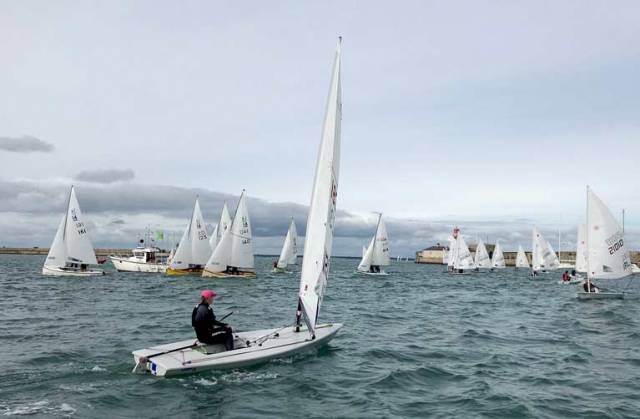The CH Marine Laser sponsored, Final Fling regatta took place in Dun Laoghaire on Saturday with a whopping 45 entries across two race courses writes Gavan Murphy,
Dun Laoghaire Laser Class Captain
Competitors were greeted by a punchy 20 knot South Westerly on Saturday morning as they came down to rig, so Regatta Fleet Race Officer, Sean Craig, wisely postponed launching his fleet by an hour to ensure they raced in optimum conditions to match their experience. This gave Sean an opportunity to do a rig set up session with some of the more apprehensive sailors in this fleet so they were confidently ready to hit the water as soon as the breeze came down.
Meanwhile, in the 34-boat, DBSC hosted Main Fleet, the weather God's attempted to make life difficult for not only the competitors but race officer, Suzanne McGarry and her mark layers, who were frequently charged with moving the weather mark and pin end to facilitate the constantly shifting and dying breeze. That said, the fleet managed to get four close races in on a windward-leeward course. In the Laser 4.7's, Archie Daly and Oisin Hughes of RSGYC were 1st and 2nd, while Christian Ennis of NYC was 3rd. In the Laser Radial's, Barry McCartin of CBSC/RSGYC showed his class with four wins from four, Conor Clancy and Kate Fahy of RSGYC were 2nd and 3rd respectively. In the Laser Standard's, Damian Maloney of the RSGYC showed a clean set of heels with three 1st places and one 2nd. Ian Simington and Robbie Walker also of the RSGYC were 2nd and 3rd respectively.
"There was a whopping 45 entries across two race courses"
On the Regatta Fleet race course, Race Officer Sean Craig managed to get 5 quick-fire races in on a short triangular course for his charge of 11 boats. In the Laser Standard class, Maurice Mason of the RSGYC took the honours with Mick Shelley, also of the RSGYC close on his heels throughout. Indeed, there was a funny incident in the last downwind leg of the last race, where both competitors main sheet's managed to run clear of the blocks at the same time....a mad scramble ensued only for Maurice to get his main sheet re-tied and got to the line just ahead of Mick. A course in stopper knot skills is duly noted for these two! In the Radial Class, Oisin Hannon, Heather Craig and Rachel Crowley of the RSGYC took the honours, while in the Laser 4.7 class, Lorraine O'Connor and Alec Munro took 1st and 2nd respectively. For the majority of the sailors in this fleet, this was their first regatta which they did remarkably well to compete in and manage so effectively. Indeed, coach Richard O'Rahilly commented he was really encouraged by the closeness of racing and boat handling ability he witnessed. We hope to see some of these sailors make the transition to frostbiting this winter and indeed on to the regatta and Laser circuit next season.
A casual prize giving took place for the Lasers on the balcony of the George after racing, thanks to CH Marine. This was followed by a Grant Thornton sponsored champagne reception, compliments of Mick Shelley and the now infamous Dun Laoghaire Laser class end of season dinner in the George that evening which was superbly attended by 30 people.
Huge thanks again to Laser prize sponsors, CH Marine; DBSC; George Sailing Manager, Ronan Adams; Race Officers, Suzanne McGarry and Sean Craig and their respective rescue and committee boat teams; namely, Shirley Gilmore, Caroline Liddy, Barbara Conway, Liz Aylmer, Hilary Bloxham and Brian Mulqueen.
































































